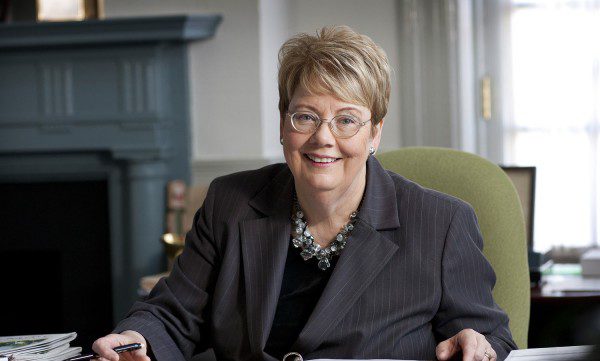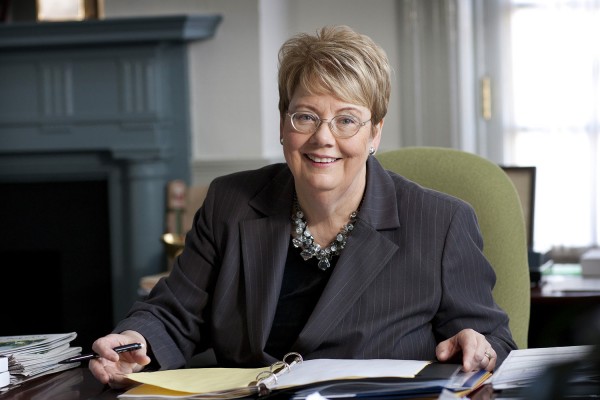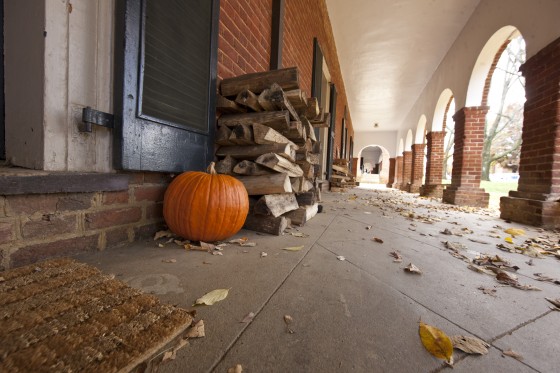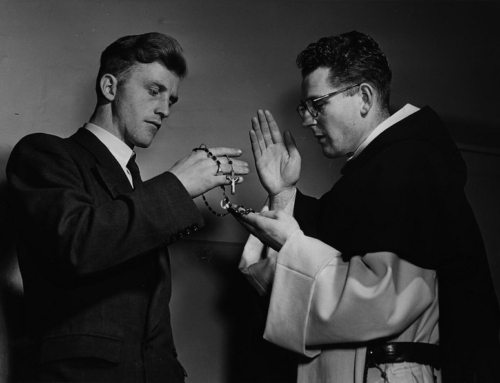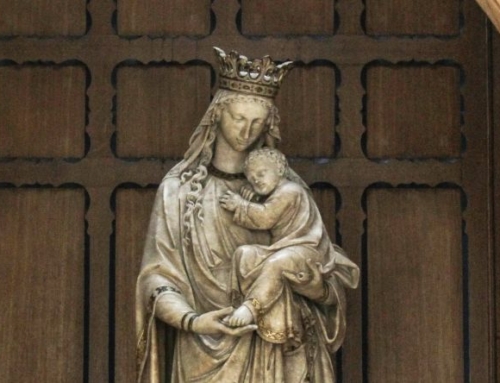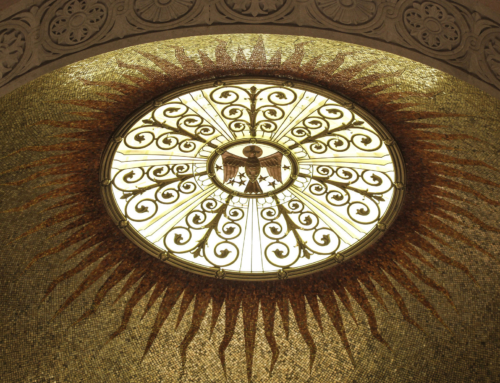From her office overlooking the Grounds of the University of Virginia, President Teresa Sullivan enjoys a perfect view of the Rotunda, the signature building and architectural centerpiece of ‘Mr. Jefferson’s University.’ Mr. Jefferson certainly looms large over the university he founded to educate the young men of Virginia in 1819, and not just through a Palladian dome. Jefferson intended to build a different sort of university, one that would be intentionally secular from the start. The heart of the campus—or, in UVA speak, the Grounds—is not a church or chapel, but rather his handsome neoclassical Rotunda. He went so far as to declare in a letter that “a professorship of theology should have no place in our institution.”
It is entertaining to imagine what would vex Mr. Jefferson more today: the fact that the president of his university is a woman or that she is a practicing Catholic. A professor of sociology by training, Sullivan came to Charlottesville from the University of Michigan in 2010, when she was elected UVA’s eighth president. The years since have certainly been eventful, with the university (and Sullivan herself) at the center of several national media controversies. Through it all, though, she has persevered and remained focused on her central functions as president: promoting the sound formation of the students of the university and securing the long-term future of UVA in its fundraising, faculty hiring, financial aid development, and renewal of its Grounds.
As President Sullivan sat down with Dominicana in her office for this interview, the elaborate scaffolding around Mr. Jefferson’s Rotunda testified to her work on the latter front. The discussion that followed offered a glimpse into her understanding of the purpose of a liberal education, the role of parents and administrators in the formation of college students, and the place of Catholics in secular universities like Mr. Jefferson’s.
“A Species of Parenthood”
What is the purpose of a liberal education? For President Sullivan, the touchstone seems to be formation. The experience of a liberal education is meant to be more than merely a body of knowledge learned or a series of credentials obtained. Rather, she emphasized the habits of mind gained from the experience—a broadened perspective, the ability to engage in vigorous yet respectful dialogue, and a method of learning and understanding that will perdure long after Final Exercises (the UVA term for commencement).
When asked to describe her sense of her vocation as a professor and as president of the university, she compared it with her experience of raising children:
“[As] a parent I can tell you that [being a university president] is a species of parenthood because you are helping to give this generation—young people who come to us roughly at age eighteen not completely formed—[an education in] what it means to be an adult while they’re here. And it’s a great privilege to have part in their formation, but I also believe it’s important to the future of the country. The University of Virginia is an important university, and what we do matters, and people come here to be students because they believe we’re an important university. And they go out and take important positions in society. Sending them out of here as principled leaders is an important part of what we do.”
What distinguishes UVA as a place of formation? For Sullivan, it is clearly the university’s famed student-run Honor System, by which students pledge not to lie, cheat, or steal, with the penalty of permanent dismissal from the university. The Honor System dates back more than 150 years and is part of the student body’s tradition of trust and self-government. Sullivan sees these as defining qualities:
“We are a secular university that is unusual in having pretty openly espoused values. [All our students], when they matriculate, sign our honor code: they promise not to lie, cheat, or steal while they’re here. And that’s judged only by their peers. I play no role in the Honor System. I don’t enforce it, I just endorse it. But that’s one of the reasons that students come here, because they are looking for a moral anchor in their life and the Honor System provides that for them.”
“When the alumni come back here, they’re interested in what the buildings look like. But what they really want to know is if the Honor System is still working. It’s a very important part of their identity. And in talking to employers I know, it’s one of the reasons they hire UVA students, because they say, ‘I know they’ll know all the technical material, but I also know they’ll be honest.’ It’s an important thing in today’s society that we’re kind of a Good Housekeeping seal on a student’s honesty.”
Strikingly, from Sullivan’s perspective, what has made UVA so successful in forming its graduates—the university’s ‘parenting style,’ as it were—is its emphasis on student autonomy and self-government according to a socially binding code of virtuous behavior. Such a system is heavily dependent on collective acceptance or buy-in by the students themselves. The role of administrators is secondary—exhorting, recruiting, and the like:
“To some extent I am the public face of the university, and so I have the opportunity on many occasions to speak in public, to talk about the Honor System and what it means and also talk about the fact that we have values here that we freely promulgate, including the value of respect for one another, which is one that is unfortunately not as honored in the United States today as we might wish it were. So I play that role, but I also help to recruit the next generation of faculty here, and that’s one step removed from the formation of the students, and I play a pretty active role in recruiting the students themselves to come here. So I think I get involved at most levels of the organization in terms of enunciating the value proposition and why it’s important for this university.”
Dialogue & Political Correctness
Beyond the character cultivated by the Honor System, what does a liberal education at the University of Virginia provide for its students? President Sullivan offered that the pursuit of truth is indeed an important purpose of higher education, but that for students, the greater value is gained from learning how to learn:
“The pursuit of truth wherever it may lead is one of Mr. Jefferson’s sayings. I do think that is something that we take seriously in the laboratory or in the library or in the classroom, and that is one important end, I suppose, at one end, of higher education. But another important one is that higher education for the student is not just about the transmission of knowledge. If that’s all it were, we could just send them to the library for four years.”
“There is something more to it. There is an engagement with other human beings that I think is really an important part of liberal education. Not just the faculty member in front of the class, but also with classmates. Learning to engage with them in their ideas, learning to engage with a much more experienced teacher and the teacher’s greater depth of knowledge of the material, that’s an important part of the formation of how you learn how to learn.”
In order to ‘learn how to learn,’ Sullivan holds that there must be a broadening of perspectives and horizons, which is only truly possible when diverse voices come together in open, honest conversation:
“I think dialogue is absolutely important so that no one comes in hugging what they know so tightly to themselves that they can’t engage with anybody else, especially because they’re fearful that what they know might get attacked. That’s a difficult situation. I think diversity is important. If everybody comes here from exactly the same background, they won’t be challenged in their ideas nearly as much as if we had brought together people from different social classes or racial backgrounds, different ethnic backgrounds, different countries. I challenged every one of our entering students this fall by the end of this first semester that they would have made a friend of somebody from a different background than their own. And I don’t care how they would define that difference, but I do care how they define friendship. It has to be more than just, ‘We had a cup of coffee together.’”
What counts as genuine diversity? At the very least, it would seem to be more than a strictly provincial attitude:
“Because I do think that’s one of the real values of an institution like this, that you can test your views against somebody who maybe is a refugee from a Muslim country, and you’re not a refugee, and you’re not a Muslim, and you’ve never lived in a different country. . . . As I like to say to people that think there should be more Virginians here, I think that diversity is more than Fairfax County meeting Loudon County.”
When asked what poses the greatest threat to the life of the mind at the University of Virginia, President Sullivan quickly named political correctness for precisely the way in which it inhibits the kind of broadening conversation that she views as essential to liberal education.
“I’m going to use the phrase ‘political correctness,’ but let me go on and define what I mean about it. It is a kind of dogmatic protection of the respect that is due people and a great concern that that respect is about to be infringed. And I think that political correctness comes from a good motivation. The motivation is for people not to be diminished or hurt in the dialogue. But the effect of it can be that the dialogue just can’t happen because too many things are ruled off the table from the beginning as non-discussable. And that limits a lot what [kind of] conversations you can have with each other.”
“Bulldozer Parents”
Overprotected students—those who don’t experience the kind of broadening and maturation that a good college formation is meant to provide—are a source of worry for President Sullivan. At the same time, she claims that a major lacuna in undergraduate formation at colleges across the country is a lack of readiness to enter into collegiate social life. As a result, the transition from the intense structure of the high school rat race to the novel freedom of undergraduate life poses a major difficulty.
“I’m not sure we’re teaching [American college students] enough about how to engage in healthy human relationships. I’m not sure we put enough of a premium on it in their undergraduate formation. And I know they come to us from high school hungry for that and not very well prepared for it. One of the reasons I think it’s particularly a problem here is [that, in order] to get here, you have spent your high school years in a pretty ascetic way. You’ve studied hard, you haven’t spent your time doing the traditional high school stuff. You might have done a little of it, but you haven’t spent a lot of time socializing because you had to get the grades. So they get here, and we sometimes find that in the first year or so they’re very afraid they won’t fit in. They worry a lot about fitting in and sometimes compromise their values to fit in with a crowd they then don’t want to fit in with. They enter prematurely into relationships that they’re not ready for yet, and they don’t necessarily have a good model in their head for what that good relationship ought to look like. And I’m not sure we’ve always been good at addressing that, talking with them.”
These two realities—students who are overprotected and immature, and students entering heedlessly into ill-advised relationships—are, in Sullivan’s eyes, linked. While many focus on the role of college administrators and their move away from acting in loco parentis, Sullivan offers a different account. While granting that this shift in university administration is “probably involved to some degree,” she goes on to note:
“Here at the university, we’ve always put a big premium on self-governance, and our students are forced to confront some difficult decisions by virtue of self-governance that they might not have to at other schools. But the role of the actual parents has also changed. The parenting style of parents today is much different from what it used to be. The students are very connected to their parents to the extent that they text message them a couple of times a day. I communicated with my mother ten minutes a week, as long distance was expensive. It’s a very different dynamic.”
“We used to talk about helicopter parents. Now we talk about bulldozer parents, who want to plow every possible obstacle out of the way of their children. And so we’ve actually found eighteen-year-olds coming to us more dependent in a way than they used to be because their parents have stepped in whenever there was an obstacle in any way, and they’ve not developed the ability to stand on their own two feet even though they’re technically adults. That’s not true of every student obviously. But it’s true of a greater portion of our students, to the extent that the vice president of affairs has been talking to me about this in a concern that students aren’t as resilient today as they used to be because they really haven’t handled any adversity before they get here.”
Sullivan sees the change in dynamic between parents and their college-age children as creating a prolonged period of adolescence. Essentially, by remaining tethered closely to support from home, students are prevented from undergoing the kind of formation and growth in character that President Sullivan sees as the essential mark of a liberal education.
“I tell a little joke when I speak to the parents of the incoming class, and I say, ‘You might be a helicopter parent if you’re looking for a condo within 500 yards of the Rotunda.’ And it always gets a big laugh. But the truth is, there are parents doing that, and they’re here all the time. And sometimes I just want to say, ‘Please let your child grow up!’ But growing up involves making mistakes and living with the consequences of those mistakes. And for some parents, that is too big a price to let their children pay, even if it means their children stay emotionally dependent and unable to stand on their own two feet by graduation.”
“You Can Lose Your Faith in a Lot of Places . . . ”
Sullivan’s understanding of this dynamic leads her to offer an intriguing answer to the question that many Catholic parents ask themselves when it comes time to select a college for their children: ‘Is it worthwhile to send my Catholic son or daughter to a major secular university where their faith will almost surely be lost?’ Sullivan sees this question in light of the overall shift in parenting styles, and challenges some of the underlying assumptions.
“Let me say first of all, there are many schools in the US that have unique visions, and I don’t criticize any family that decides that another mission is right for them and their family. But let’s look at the premise of ‘I don’t want my child to go to a place where their faith might get challenged.’ Hmm . . . doesn’t that sound like a bulldozer parent? ‘I’m going to take away all the obstacles that they might find there to their faith.’ How long are you going to keep doing that? What about when they go out and take a job in the workplace? How long are you going to be able to protect them in this way? I just worry about that premise because I think it’s true. I think you can lose your faith in a lot of places, including Catholic institutions.”
She then turns to focus on the experience of being Catholic at UVA and describes how the Catholic faith can be lived out fully—and how many do precisely that:
“But let me flip it to the other side and talk about what it’s like for a committed Catholic to come to the University of Virginia. So we have a very active Catholic student ministry. Last Saturday, I went to the student Mass at the [UVA] chapel at nine o’clock. It was crowded, it always is. There’s excellent music. The students know each other very well. And by the way, they had five other Masses yesterday I could have gone to at St. Thomas [St. Thomas Aquinas University Parish, the Dominican parish in Charlottesville, Virginia]. Or there are two other Catholic parishes in town. I’ve got two priests on the faculty here.”
Academically, what has become of the university where Jefferson vowed to “welcome no theologian”? Theology is certainly not studied as a science in the classical, Catholic sense:
“This is a place where religion is taken seriously, but it’s also debated. We have a very active religious studies department, and there are people there who study all religious traditions. We have very serious discussions about matters of faith and morals here at the institution, just not under the aegis of a particular creed. So I think that a practicing Catholic can be very comfortable here. They could certainly find plenty of like-minded students if they want to. And if they don’t want to, if they want to see what it’s like to go out completely on their own, they can do that too. We have intentional Christian communities here of students who choose to live together because they want to follow a particular form of discipleship together. Our largest student organizations, in fact, are religiously oriented. So there’s plenty of opportunity here for a student who comes believing and wants to leave believing.”
In an observation befitting a labor force demographer, Sullivan concludes by observing that young Catholics have historically sought the best education possible—even at secular, public colleges. She points to a long tradition of acceptance at these schools—that, even as such institutions did not support Catholic life explicitly, it was possible to flourish as a Catholic student there and still be a full member of the university community.
“I went to Michigan State, where there were more Catholic students than Notre Dame had students. It’s simply been the case that since the children and the grandchildren of the immigrants have been able, they’ve been going to the best universities they could get into. That’s true here at the University of Virginia, just as it’s true at schools on both coasts and in the middle of the country.”
The extent to which this history and approach satisfy the contemporary concerns of Catholic parents remains an open question. Answering Sullivan’s counter-question, though, offers a real challenge to those who would retreat from the secular academy: if you would seek to protect your child from losing his or her faith in a pluralistic setting at college, how are you going to do so when that same child has to get a job in the modern economy? The tension between building communities of virtue and maintaining a presence in the public square is on full display in this debate about colleges.
Ambivalence
Many parents continue to entrust their children to the University of Virginia, where, for President Sullivan, the work of a liberal education is about forming the whole person—a graduate who, on the day of Final Exercises, is a broader-minded individual, a better thinker and learner, and someone of tested, true, and honest character. She describes her most satisfying moment as president of Mr. Jefferson’s University as speaking with parents who have seen this change take place in their sons and daughters by the time they graduate:
“I’ve been here long enough that I can talk to the parents I met when they brought an incoming student, and now we see that student graduating four years later. They talk to me about how much it means to them and how much they’ve seen their student grow and mature. It’s not the same relationship it was before, but it’s good in a new way. That’s really special. That’s what tells me we’re really doing what we ought to be doing. And the parents are glad for their student, not just because they did a good job—they finished their degree, they’ve got a job waiting—but because of who they have become. That’s what is especially touching to me. It’s the emphasis on who you have become. And that’s what we hope to do.”
President Sullivan concluded with some words of wisdom that she offers to first years (UVA parlance for freshmen) just beginning this process of formation and facing the emotionally fraught transition between high school structure and collegiate independence. She counsels them to recognize that their emotions will not always be stable guides for their actions; indeed, at significant moments, they will feel a dizzying array of conflicting emotions at the same time. Sullivan concludes with a note of practical wisdom, doubtlessly gained through hard experience:
“And when we bring [students] in each fall as first years and they start on this journey, we tell them, ‘You’re going to grow and change, and it won’t always be easy, but that’s a good thing.’ And I also tell them, ‘There’ll be times when you feel mixed up emotionally. You should know that at every transition point in your life that’s going to happen to you. We call it ambivalence. And that doesn’t mean there’s anything wrong with you, because everybody else is feeling it too. They might not show it, but everybody is feeling it. That mixture of being happy and sad or being angry and contented, whatever the mix is for you, that just comes with the human condition, and the fact that you’re feeling it now just means it’s a transition point in your life. And there’ll be many such transitions, but that’s how you grow. You grow with a little bit of pain.’”
With that much, at least, we may imagine Mr. Jefferson would heartily concur.
To download a printable PDF of this Article from
Dominicana Journal, Winter 2015, Vol LVIII, No. 2, CLICK HERE.

